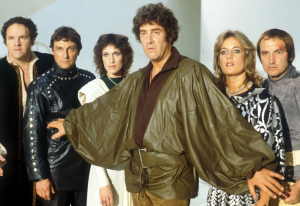
The new season of Westworld is in full swing on HBO, and this one has left us with just as many questions as the original. But that’s part of the intrigue, right?
Videos by ComicBook.com
But someone may have found something deeper within the sci-fi series, indicating that there could be a lesson or two to be learned by those that run video game studios.
Author Michael Futter breaks this down in his article at Variety, in which he talks about the “broken version of leadership” served up by Robert Ford, portrayed in the series by Sir Anthony Hopkins.
(Keep in mind there are some mild spoilers ahead if you haven’t watched the first season. Proceed with caution.)
“Ford is the embodiment of nearly everything an entrenched game director should avoid becoming,” Futter noted. “He suffers from what’s known as ‘Founder’s Syndrome,’ even if his take is more murderous than most who share his affliction. Founders are typically both revered as geniuses central to the success of their organizations and feared for their capricious behavior. In some cases, they become gods of their domain, reshaping and pivoting without seeking guidance or counsel.
“Whether intentionally manufactured or accidentally crafted, leaders suffering from Founder’s Syndrome tend to exhibit four behaviors that serve to solidify and extend their reign. Westworld‘s Robert Ford is a textbook case of how inspired leadership can sour and rot.”
For instance, Ford’s focus on a “wildly expensive new narrative” shows just how slowly but surely genius can get out of hand. For instance, when Sizemore presents a new expansion in the form of Odyssey on Red River, Ford rejects it immediately, causing weeks of work to be thrown out. That creates jealousy as a result, leading to the potentially tearing apart of Westworld.
“The other side of some founders’ tendency toward undermining subordinates is that they tend to thrive on glory,” Futter continued. “Jealousy breeds when others in the organization are praised (or are in the position where they could steal the spotlight). The Verge recently reported that Telltale Games experienced these challenges under co-founder Kevin Bruner’s leadership.
“Morale in organizations is based on a number of factors, both extrinsic (compensation and benefits) and intrinsic (the internal rewards one receives from their work). Creative leaders should have a clear vision, but also give subordinate experts the freedom to execute on it. Overprescribed direction can stifle creativity and destroy those crucial intrinsic rewards that help employees get out of bed in the morning.”
He further explains in the article how Ford’s cutting remarks and aggressive actions can further take their toll — and not just with Sizemore. “During a lunch at a secluded and empty restaurant in the park, Ford goes out of his way to make Cullen feel uncomfortable. His choice of venue is the first attempt to unsettle her. Ford has them seated at the exact same table Cullen had been at during a childhood visit to Westworld.
“The intent is twofold: to evoke a sense of child-like vulnerability and expose that Ford knows everything about Theresa, thus putting her at a distinct disadvantage. She doesn’t know anything about the narrative he’s working on, but Ford knows minute details of her life. He then silently commands every host in the area to freeze, including the waiter pouring wine into Cullen’s glass. As the two continue to talk, wine overflows and spills all over the table and the floor, threatening to cover her.
“Additionally, Ford reveals that he knows that Cullen is sleeping with another park employee (though not how he knows just yet). The two attempted to keep their tryst quiet, and until this encounter thought they had been successful. Turning the conversation to Cullen’s personal relationship is meant to shame her.
“As the conversation concludes, Ford has the hosts leave as construction equipment is about to demolish the palatial estate. Cullen believed she was summoned to a lunch with her boss. Instead, she was the victim of misdirection and manipulation.”
And eventually it leads to Ford eliminating certain threats by the conclusion of the first episode. “In Westworld, the board of directors realizes that Ford has become a problem of their own making. He is the only person left alive who truly understands how the hosts’ minds work. In order to diminish his power, they have to resort to stealing their own source code.
“After a failed attempt to intimidate Theresa Cullen, Ford uses her relationship with Bernard to lure her to a remote section of the park. There, he reveals his greatest deception, shocking both of them: Bernard is a host tasked by Ford to seduce and spy on Cullen. Ordering Bernard to murder Theresa is a twofold act of brutality, as he created the conditions that necessitate her elimination before turning her lover against her.”
It’s a fascinating article, and well worth a read if you want a deeper look into Ford’s behavior, and how they can impact more than you might expect. You can read it here.
Westworld airs Sundays on HBO.








